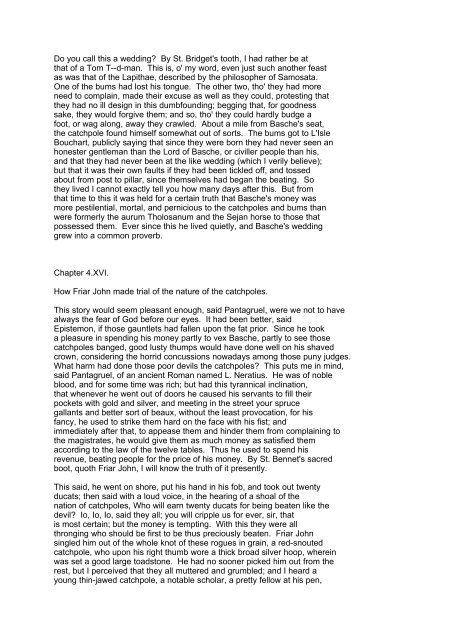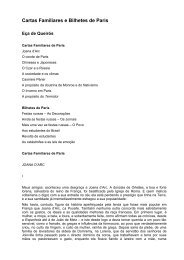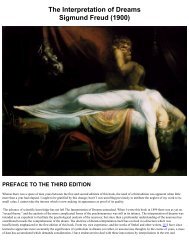- Page 1 and 2:
Gargantua and Pantagruel, Complete.
- Page 3 and 4:
Chapter 1.XIII.--How Gargantua's wo
- Page 5 and 6:
Chapter 1.LII.--How Gargantua cause
- Page 7 and 8:
Chapter 2.XXXI.--How Pantagruel ent
- Page 9 and 10:
Chapter 3.XXXVI.--A continuation of
- Page 11 and 12:
Chapter 4.XX.--How the pilots were
- Page 13 and 14:
Chapter 4.LXIII.--How Pantagruel fe
- Page 15 and 16:
Chapter 5.XXXIX.--How we saw Bacchu
- Page 17 and 18:
to be found of his intercourse, his
- Page 19 and 20:
the eye had likewise its share of t
- Page 21 and 22:
knew Rabelais' book or owed anythin
- Page 23 and 24:
version has often been reprinted si
- Page 25 and 26:
their effect, and appease the storm
- Page 27 and 28:
to be discovered, for Rabelais does
- Page 29 and 30:
The scene takes place, not at Paris
- Page 31 and 32:
was necessary to include such terms
- Page 33 and 34:
single duodecimo volume, begun by C
- Page 35 and 36:
Our full enjoyment which was our de
- Page 37 and 38:
question the prince of philosophers
- Page 39 and 40:
ead the rest, with all the ease of
- Page 41 and 42:
A great waste in the bottom of his
- Page 43 and 44:
How Gargantua was carried eleven mo
- Page 45 and 46:
owls to ting, glasses to ring. Draw
- Page 47 and 48:
Gargamelle began to be a little unw
- Page 49 and 50:
what grievous quarter soever he kep
- Page 51 and 52:
his gloves were put in work sixteen
- Page 53 and 54:
connection, for vice is evil. This
- Page 55 and 56:
dabbled, paddled, and slobbered eve
- Page 57 and 58:
hares and partridges for all this w
- Page 59 and 60:
In shitting yes'day I did know The
- Page 61 and 62:
Chapter 1.XV. How Gargantua was put
- Page 63 and 64:
good, and do spit the better for it
- Page 65 and 66:
them. Hem, hem, aihfuhash. We have
- Page 67 and 68:
Upon these words they framed articl
- Page 69 and 70:
At primero. At the chess. At the be
- Page 71 and 72:
thought fit to drink a little, and
- Page 73 and 74:
his body of natural excrements, the
- Page 75 and 76:
themselves, they went unto the most
- Page 77 and 78:
gaping changelings, codshead loobie
- Page 79 and 80:
they came to Seville, where they ro
- Page 81 and 82:
some, with a smart souse on the epi
- Page 83 and 84:
Picrochole, to know wherefore he ha
- Page 85 and 86:
proud that durst have offered to in
- Page 87 and 88:
sake, let us live henceforward in p
- Page 89 and 90:
party of these hath subdued Luxembo
- Page 91 and 92:
When they heard these words, some a
- Page 93 and 94:
thinking that the bullets and stone
- Page 95 and 96:
dare to speak nor cough. Washing th
- Page 97 and 98:
thigh of this leveret is good for t
- Page 99 and 100:
to make you a fine cracker and comp
- Page 101 and 102:
do not make a monk of him in my ste
- Page 103 and 104:
their enemies, without leaving so m
- Page 105 and 106:
his bed was praying unto God for th
- Page 107 and 108:
superficial; it entereth not into t
- Page 109 and 110:
Touchfaucet being at these words ve
- Page 111 and 112:
affrighted Picrochole and his men,
- Page 113 and 114:
Alpharbal augment the repute thereo
- Page 115 and 116:
him; but the monk gave him a very p
- Page 117 and 118:
diversity of these languages. In th
- Page 119 and 120:
Which neighbourly affection nourish
- Page 121 and 122:
Their gowns, being still correspond
- Page 123 and 124:
him one of the ladies, namely, her
- Page 125 and 126:
aiming at that mark which God by hi
- Page 127 and 128:
this wholly, without distracting or
- Page 129 and 130:
little towards the left hand, like
- Page 131 and 132:
Who begat Bolivorax, Who begat Long
- Page 133 and 134:
profitable unto them; for some said
- Page 135 and 136:
Chapter 2.IV. Of the infancy of Pan
- Page 137 and 138:
else to do, might pass their time i
- Page 139 and 140:
that was coming upon the same very
- Page 141 and 142:
in frosty nights to warm their bums
- Page 143 and 144:
The Litter of Treasurers. The Jugli
- Page 145 and 146:
and by which our name continues ble
- Page 147 and 148:
and love them as thyself. Reverence
- Page 149 and 150:
noghtans, al en seg ik u niet een w
- Page 151 and 152:
the man. Now at this same very time
- Page 153 and 154:
Chapter 2.XI. How the Lords of Kiss
- Page 155 and 156:
neighbours, that I could wish from
- Page 157 and 158:
swilling down and tippling at the g
- Page 159 and 160:
Which sentence being pronounced, th
- Page 161 and 162:
of bacon wherewith I was stuck, kep
- Page 163 and 164:
discipline; signifying thereby that
- Page 165 and 166:
gallantly according to the fashion
- Page 167 and 168:
sin of longing and disordinate desi
- Page 169 and 170:
treasure. Ho, my friend! said he, i
- Page 171 and 172:
Alexandria, even unto Aethiopia, to
- Page 173 and 174:
and inconsiderable disciple of my m
- Page 175 and 176:
After that, Thaumast began to puff
- Page 177 and 178:
shall feel the sweetness thereof ev
- Page 179 and 180:
as small as he could. Then, carryin
- Page 181 and 182:
they had gone a great way, and were
- Page 183 and 184:
And I, said Epistemon, know all the
- Page 185 and 186:
head, he killed him, and, bearing h
- Page 187 and 188:
But to his elect, as we must believ
- Page 189 and 190:
in him do put their trust and confi
- Page 191 and 192:
would to God that I had now a bottl
- Page 193 and 194:
enchanted, as we have said before.
- Page 195 and 196:
Piso, a clownish swain. Sylla, a fe
- Page 197 and 198:
apparelled after the French fashion
- Page 199 and 200:
little canvas doublet, all jagged a
- Page 201 and 202:
and unsavoury breathing which came
- Page 203 and 204:
coming out of the Trojan horse. By
- Page 205 and 206:
If you have not heard of him, I wil
- Page 207 and 208:
compatriots unfit for the offensive
- Page 209 and 210:
Cana in Galilee; for how much soeve
- Page 211 and 212:
affability, courtesy, gentleness, a
- Page 213 and 214:
living, and not become a better mes
- Page 215 and 216:
Chapter 3.III. How Panurge praiseth
- Page 217 and 218:
obliged to the other, as having bor
- Page 219 and 220:
thereto from the milt, giveth warni
- Page 221 and 222:
each of any price or value. It tran
- Page 223 and 224:
Sont pour ceux-la, qui les retienne
- Page 225 and 226:
navigators may the further off perc
- Page 227 and 228:
Wenches. When Yoland saw her spouse
- Page 229 and 230:
Chapter 3.X. How Pantagruel represe
- Page 231 and 232:
Whom Fate let us see, And would no
- Page 233 and 234:
Neither him nor them, answered Pant
- Page 235 and 236:
too too strong. Am I a Jan? quoth P
- Page 237 and 238:
ound, and amply, my sleeping is not
- Page 239 and 240:
purpose to put a branch or two of c
- Page 241 and 242:
Is she a cucquean for that? How the
- Page 243 and 244:
Chapter 3.XV. Panurge's excuse and
- Page 245 and 246:
y a long continuance of time, promp
- Page 247 and 248:
Chapter 3.XVII. How Panurge spoke t
- Page 249 and 250:
Thy fame upheld (Properly, as corre
- Page 251 and 252:
about; whilst, in the interim, the
- Page 253 and 254:
was no remarkable thing in the whol
- Page 255 and 256:
then, having brought him before Pan
- Page 257 and 258:
finger-fillipings! Then did he leav
- Page 259 and 260:
destiny of his intended marriage. F
- Page 261 and 262:
suffer, as it is frequent and usual
- Page 263 and 264:
the limits of our chancel at Mirebe
- Page 265 and 266:
purging of his brain of that peccan
- Page 267 and 268:
Nevertheless, quoth Epistemon, cont
- Page 269 and 270:
High Germans in their boiling of an
- Page 271 and 272:
Passable C. Positive C. Exquisite C
- Page 273 and 274:
By Saint Rigomet, quoth Friar John,
- Page 275 and 276:
I understand thee well enough, said
- Page 277 and 278:
Stupified C. Abashed C. Melancholy
- Page 279 and 280:
anks that lie alongst the coast of
- Page 281 and 282:
especially seeing a perfect philoso
- Page 283 and 284:
corrupt and depraved manners, one l
- Page 285 and 286:
is that Diana is said to be chaste,
- Page 287 and 288:
can no more aptly or expediently ma
- Page 289 and 290:
animated and of a living nature, th
- Page 291 and 292:
humility begged of him that he woul
- Page 293 and 294:
me which I would not most willingly
- Page 295 and 296:
As this discourse was ended, Pantag
- Page 297 and 298:
Pan. Let it be, then, in the name o
- Page 299 and 300:
Pan. It is bien chien, chie chante,
- Page 301 and 302:
Then dinner being done, and the tab
- Page 303 and 304:
piece of money, if he had it. Where
- Page 305 and 306:
Swollen and puffed up f. Ill-clawed
- Page 307 and 308:
favourable opinion of my uprightnes
- Page 309 and 310:
Comit. et Archi. lib. 12, hath freq
- Page 311 and 312:
old Partenay. This amicable disposi
- Page 313 and 314:
sensible where his shoe did pinch h
- Page 315 and 316:
non epistolis. l. non nudis. Et si
- Page 317 and 318:
are pleased to do me the honour to
- Page 319 and 320:
verbal defence. Which resolution of
- Page 321 and 322:
done, Triboulet with his fist gave
- Page 323 and 324:
the more scandalous that your conju
- Page 325 and 326:
fellow. He will not forget those wh
- Page 327 and 328: tithe-haling of their goods, they c
- Page 329 and 330: his mole-catching abettor, be entra
- Page 331 and 332: pennyroyal, peony, rose of the moun
- Page 333 and 334: Other some there are which have obt
- Page 335 and 336: fifth Sorbapple-tree; the sixth Ash
- Page 337 and 338: ouncing peal or two of thundering o
- Page 339 and 340: animated creature, be quickly suffo
- Page 341 and 342: as easy to find a bully without cou
- Page 343 and 344: anked among those who have nothing
- Page 345 and 346: dissatisfy. There is also a passage
- Page 347 and 348: to Frank, you may swear. You have g
- Page 349 and 350: Jupiter happened then to be holding
- Page 351 and 352: told, they hear what is said here b
- Page 353 and 354: about, they made it their business
- Page 355 and 356: Parthians, Pantagruel took his leav
- Page 357 and 358: master, with every needful particul
- Page 359 and 360: the contents of which were as follo
- Page 361 and 362: turquoise stones, and unions were a
- Page 363 and 364: mutton, hark ye me a little, on the
- Page 365 and 366: I will, for your sake, replied the
- Page 367 and 368: from this same country of Ennasin,
- Page 369 and 370: day and the next; but he would need
- Page 371 and 372: Blood and oons, answered Breton, I
- Page 373 and 374: into his mutton-fist, and prayed hi
- Page 375 and 376: and cool. In the second place, you,
- Page 377: with a denudation of the uvula, and
- Page 381 and 382: invitation soberly fell to. Philome
- Page 383 and 384: Pantagruel, having first implored t
- Page 385 and 386: things, they say. I give you all Sa
- Page 387 and 388: a good spirit, boys, 'tis within a
- Page 389 and 390: wishes and designs. If a man in tim
- Page 391 and 392: wood and desert, much like the fore
- Page 393 and 394: prudent physician, seeing by some s
- Page 395 and 396: For my part, I understand it of tha
- Page 397 and 398: lantern. The guts, like a trammel.
- Page 399 and 400: If he chanced to spit, it was whole
- Page 401 and 402: monstrous physeter (a sort of whale
- Page 403 and 404: stunned, blinded, and taking his le
- Page 405 and 406: told him that it might be the use a
- Page 407 and 408: King Philip, of whom we spoke just
- Page 409 and 410: of this fight, and for anything els
- Page 411 and 412: Prick-pride. Tuzzy-mussy. Slashed-s
- Page 413 and 414: Chapter 4.XLII. How Pantagruel held
- Page 415 and 416: air. A while after, we were command
- Page 417 and 418: with her breech foremost towards th
- Page 419 and 420: adishes. After him the farmer with
- Page 421 and 422: eing willing to stay there any long
- Page 423 and 424: fingers' end, new life and activity
- Page 425 and 426: them of all their goods, take their
- Page 427 and 428: way of hind-towel, a leaf of an old
- Page 429 and 430:
observe these rare stories. How com
- Page 431 and 432:
lasses, who clapped it on her prett
- Page 433 and 434:
said at the battle of Pharsalia; I
- Page 435 and 436:
Chapter 4.LVII. How Pantagruel went
- Page 437 and 438:
Plutarch in his book of the Cessati
- Page 439 and 440:
Teals. vinegar intermixed. Thrushes
- Page 441 and 442:
Water-gruel, and Figs. Filberts. mi
- Page 443 and 444:
Thus Gaster, having caused a brass
- Page 445 and 446:
the nut, and its concave to the tar
- Page 447 and 448:
Diogenes being asked at what times
- Page 449 and 450:
Thus Atlas and Hercules clubbed to
- Page 451 and 452:
Chapter 4.LXVII. How Panurge beraye
- Page 453 and 454:
instead of mitten, I had snatched u
- Page 455 and 456:
providently to save charges, to the
- Page 457 and 458:
THE FIFTH BOOK. Chapter 5.I. How Pa
- Page 459 and 460:
like the men in my country as one p
- Page 461 and 462:
This happens when there are too man
- Page 463 and 464:
He would fain have carried us first
- Page 465 and 466:
that bully-rock Mars was detained b
- Page 467 and 468:
quoth the ass, I have done with you
- Page 469 and 470:
with a fair loom gale, and for more
- Page 471 and 472:
He also told us that there was a ph
- Page 473 and 474:
mumper told us) some large stately
- Page 475 and 476:
three hundred years last past anybo
- Page 477 and 478:
cried Friar John, next year we'll h
- Page 479 and 480:
However, there was somewhat more to
- Page 481 and 482:
for it is reserved for their worshi
- Page 483 and 484:
kept there in chains, to the great
- Page 485 and 486:
All our company seemed mightily dis
- Page 487 and 488:
We have not asked you this question
- Page 489 and 490:
you in the trivial phrase of the pl
- Page 491 and 492:
One with a wonderful engine threw t
- Page 493 and 494:
their hind retort to the recipient,
- Page 495 and 496:
gold, and so on to her craw. For th
- Page 497 and 498:
Now the music of the golden brigade
- Page 499 and 500:
silvered nymphs and officers that i
- Page 501 and 502:
who said that water is the beginnin
- Page 503 and 504:
holy-water sprinkle in the other--I
- Page 505 and 506:
is the country; may I never piss if
- Page 507 and 508:
Pan. Is this all they have? Fri. No
- Page 509 and 510:
Pan. How do you pig together? Fri.
- Page 511 and 512:
I listen to you with both my ears,
- Page 513 and 514:
damnably mistaken, for that's a lie
- Page 515 and 516:
which close together as if you join
- Page 517 and 518:
I asked what sort of study they app
- Page 519 and 520:
of Lower Poitou, with an armed cand
- Page 521 and 522:
lies, and the painted cellar also,
- Page 523 and 524:
How the temple gates in a wonderful
- Page 525 and 526:
informed by their spies that his ca
- Page 527 and 528:
Maenades, and with his rustic pipe
- Page 529 and 530:
kindly invited us to drink of the l
- Page 531 and 532:
of King Necepsus, or Petosiris, the
- Page 533 and 534:
please you, quoth Panurge. Friend,
- Page 535 and 536:
this rare gloss. Formerly an ancien
- Page 537 and 538:
first essay. Thou, who canst water
- Page 539 and 540:
whatever the surface of the earth a
- Page 541 and 542:
freely sharing Project Gutenberg-tm
- Page 543 and 544:
1.F. 1.F.1. Project Gutenberg volun
- Page 545:
Project Gutenberg-tm depends upon a









